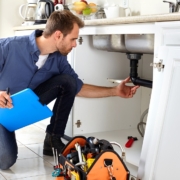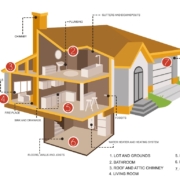Home Inspection Tips for Sellers
When you decide to sell your home, the process is not as easy as simply putting it up on the market and watching the offers come flooding in. There is more to selling a home, including the inspection. The residential inspection process includes making sure that your home is in the best shape possible to get the fair market sale price.
But it is not just about making sure you have swept the floors and cleaned the walls. Instead, there are smaller but still especially important things that you need to keep in mind when you are getting your home ready for inspection and selling.
What a Seller Should know Before a Home Inspection
Maintenance and Cleanliness: A clean house is an attractive house! You do not want to check out a house with cobwebs and dirt. The first step is to deep clean your home. Hire a cleaning company if necessary. A clean home will provide a better first impression for the inspector. Deep cleaning also gives you the opportunity to see any other problems that could be occurring in your home. This might be dripping faucets, loose doorknobs, and faulty light bulbs. Fix these issues before the inspection.
The exterior of your home should also be maintained. This does not mean you need to paint your home before meeting with an inspector. Wait until you get back the results to make large investments. Instead mow the lawn, trim any plants, and clean the pathways.
Documentation: Warranties and paperwork, such as licenses for the home’s upkeep, any repairs, and improvements will be helpful during and after the inspection. If the inspector has any questions, a repair document may be able to help. If any large issue needs to be fixed, a warranty could help with the cost.
Focus On Functionality: Ensure that the electrical, plumbing, and HVAC systems in your house are each in good operating condition and are not experiencing any sort of problems. Swap out all the air filters, investigate the smoke alarms, and make sure the light switches and electrical outlets are all operating.
The Roof: Search for all signs of damage on the roof. This is vital because ignoring roof issues can be costly. If a roof is damaged, harsh weather can leave it compromised. Search for missing shingles on the roof, any sort of patchwork that has fallen apart, and places that could lead to leaks. To avoid issues that will be caused by standing water, make sure that you or trained professionals clean the gutters and downspouts as well. You might need to replace the gutter system before an inspection.
Attic and Basement: You might not spend time in your attic or basement often. However, they are both areas that your home should be maintained. Your attic and basement are both prone to water leaks or dampness. A water leak can damage the foundation, ceiling, walls, and cause mold in the mold. The issues from water leaks are difficult to fix. Your attic and basement should be inspected regularly, not just when selling your home.
Doors and Windows: Wind drafts are not only uncomfortable but increase your energy bill. Check the windows and doors for wind drafts, cracks, and damages before calling the inspector. Any damages should be fixed.
Plumbing: We often do not pay attention to our plumbing until something goes wrong. Before your home inspection, call a plumber to check for problems you might not see. A leak might not seem like a big deal to you, but it can cause serious detrimental damage to the home and can lessen the value your home has on the market and the interest it receives from buyers.
Search for all signs of any sort of water damage or mold. All of these will certainly cause purchasers to have reservations about buying your property. Beyond that, mold can cause serious health issues for you or the people who live in your home next.
Now would also be a great time to service your home’s HVAC systems. HVAC stands for heating, ventilation, and air conditioning and it is obviously a crucial part of your property, especially during both cold and warm seasons.
And do not forget about the small fixtures in your home that you thankfully rarely use but will always be vital, if disaster strikes. Check out all fire extinguishers, smoke detectors, and carbon monoxide detectors and ensure that each of them is up-to-date and in good working order.
Address Known Problems: If you are aware of any known problems in your home, like a leaking roof or outlets that are not working, it is the time to take care of them. Any little task that you have been putting off or do not consider serious should fixed. You need to contemplate which of these could be a fundamental problem area for your home inspector.
When the inspection comes, attend it in person, or provide your contact information. This will give the home inspector a chance to talk to you about things and ask any questions they might have. This could ensure that the process goes smoothly and without delay.
Get a Home Energy Score: If you live in Bend, Oregon then getting a Home Energy Score is required when selling your home. But what is a green energy score?
“A Home Energy Score provides an energy efficiency rating for a home, similar to a miles per gallon rating for vehicle or nutrition facts on a food product. It uses a standardized tool to assess a homes structure, heating and cooling systems, and other energy-related features to produce an efficiency score.” –City of Bend
This allows buyers to compare the energy score between homes. You may learn where to make cost-effective improvements, so your home is more appealing to buyers. When you are choosing a home inspector, make sure they are also Home Energy Assessors.
Home Inspection in Bend, Prineville, and Redmond, Oregon
An in-depth inspection of your house could increase the trust of a potential buyer and even result in a faster sale and a higher price. Taking care of all these details could have a very favorable impact on the perception that home inspectors – and potential buyers – have of your house.
Deschutes Home Inspection provides home inspection services in Bend, Oregon and beyond. We can provide commercial and residential inspections. Contact us today online or call us at (541) 993-9542.


